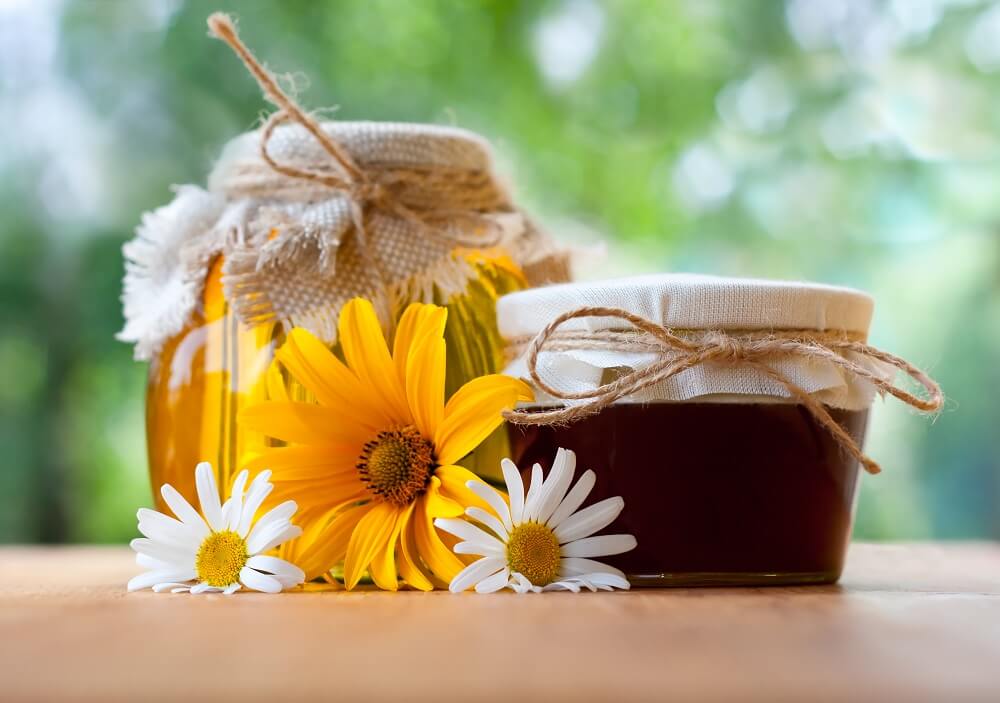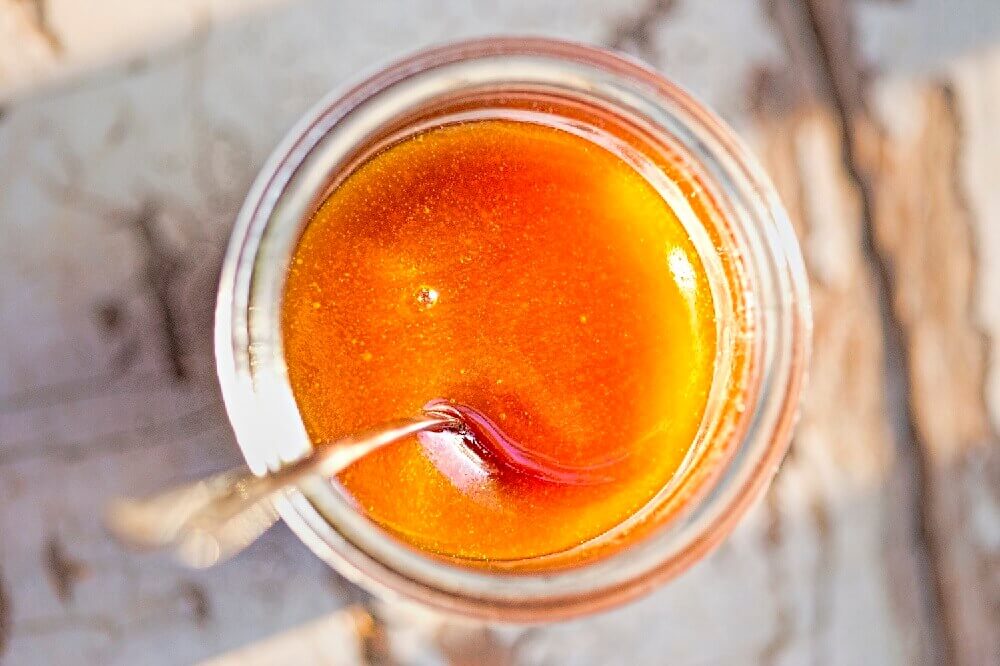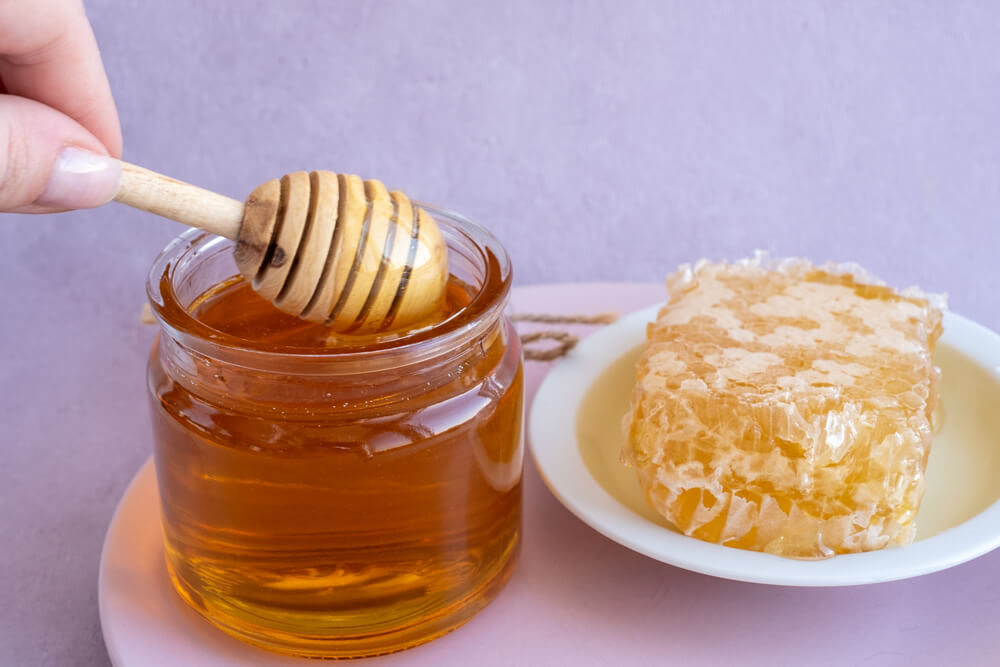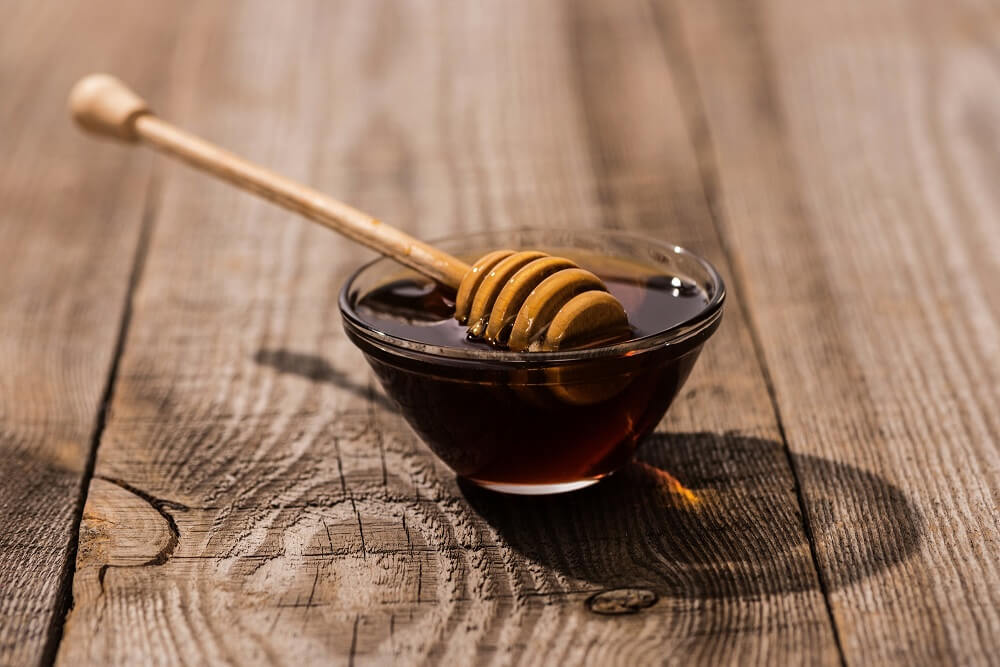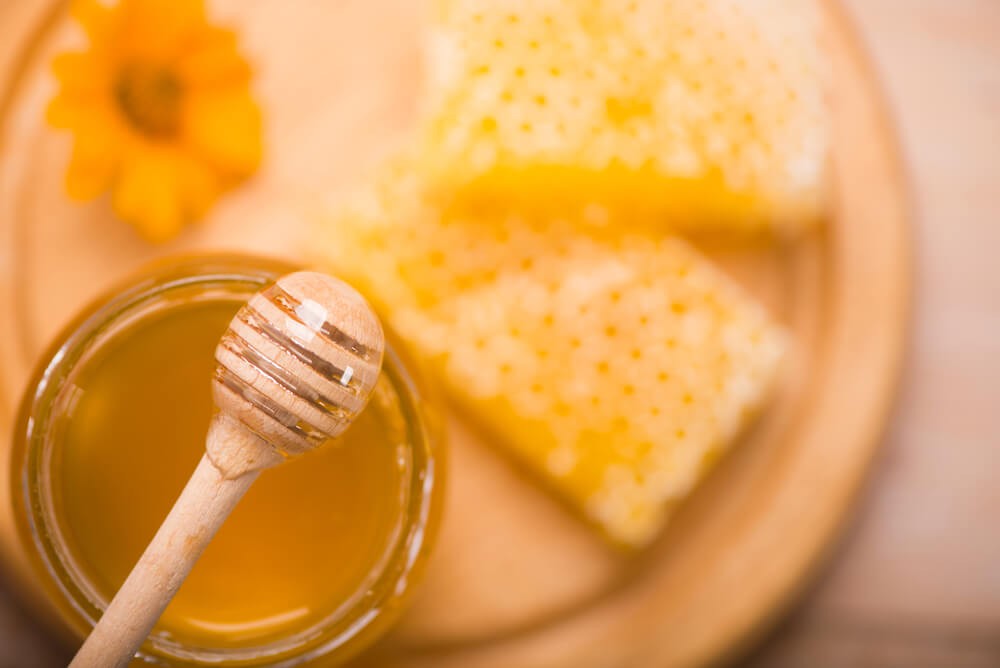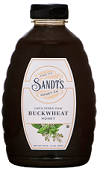Table of Contents:
What is Buckwheat Honey?
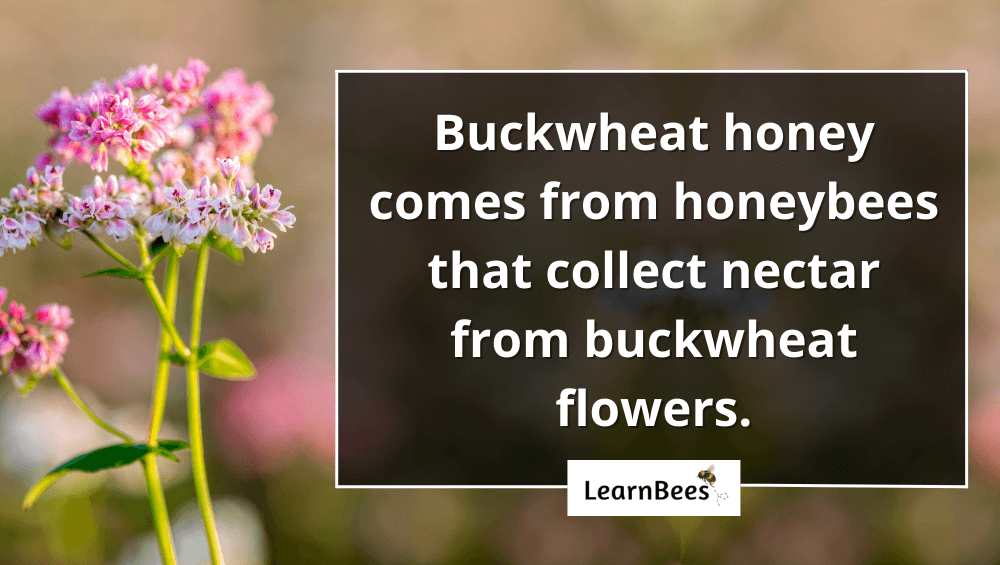
Buckwheat honey is considered a superfood due to its scientifically-backed health benefits.
But where does it come from?
Buckwheat honey is made by honeybees that collect nectar from buckwheat flowers. Buckwheat plants produce tiny, white and pink blossoms that honeybees love. Farmers also appreciate buckwheat because it’s a cover crop that improves soil fertility and reduces weeds.
Despite the color of the bright and cherry buckwheat flowers, you’ll notice that buckwheat honey actually has a dark color.
It gets this rich color from polyphenols which are antioxidants that can reduce inflammation and neutralize harmful free radicals.(1, 2, 3)
As for the taste of buckwheat honey?
Buckwheat honey’s taste is compared to various things – molasses, coffee, and even a hint of caramel. Mostly it’s described as a mix between somewhat sweet and somewhat nutty.
But there’s one thing for sure:
It’s a unique taste compared to other lighter types of honey. Plus, it’s rich in essential minerals like magnesium, iron, and phosphorous.(4, 5, 6)
Buckwheat honey also has many long-term benefits, such as promoting wound healing, heart health, and boosting antioxidants.(7, 8, 9)
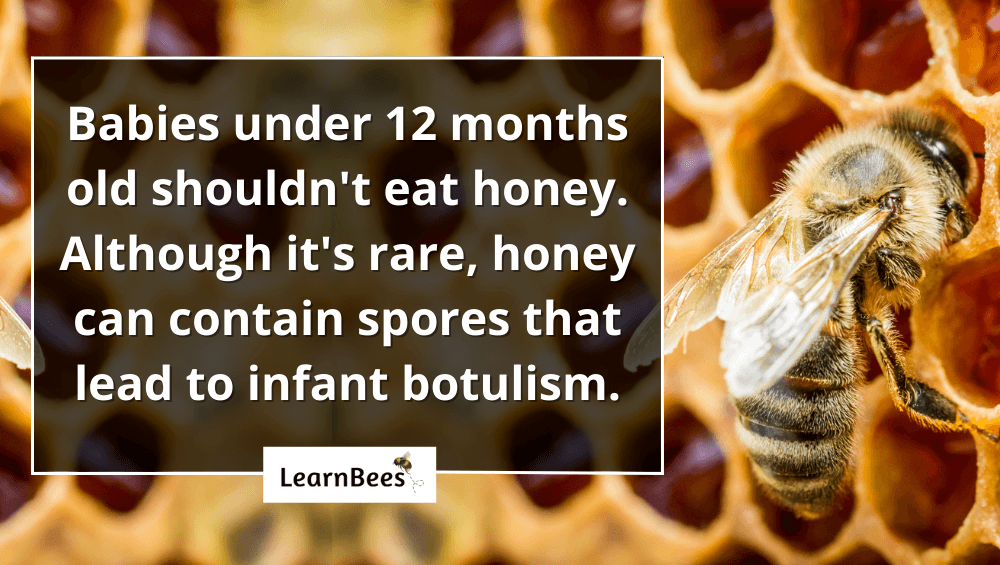
That said, babies under 12 months old should not eat honey. Although it’s rare, honey can contain spores that lead to infant botulism. Infant botulism can cause muscle weakness, weak cries, and problems breathing in babies.(10, 11)
The good news, though?
Botulism doesn’t affect older children or adults like it does babies. So, according to the USDA, honey is considered safe for people 12 months or older.
Now here’s the thing:
The majority of honey’s benefits come from the unfiltered, raw version. So you’ll want to avoid the store-bought honey sold in plastic teddy bear containers. Instead, look for labeling that says the buckwheat honey is raw and unfiltered.
Why?
Because processed honey often gets stripped of its nutritional benefits. Research shows that when honey is overly heated during the pasteurization process, it loses many of its vitamins and minerals.(12, 13, 14)
So, in summary:
- Don’t give honey to babies under 12 months old because it can contain spores that cause infant botulism.
- Make sure you buy raw and unfiltered honey to enjoy the raw buckwheat honey benefits.
What Are the Benefits of Buckwheat Honey?
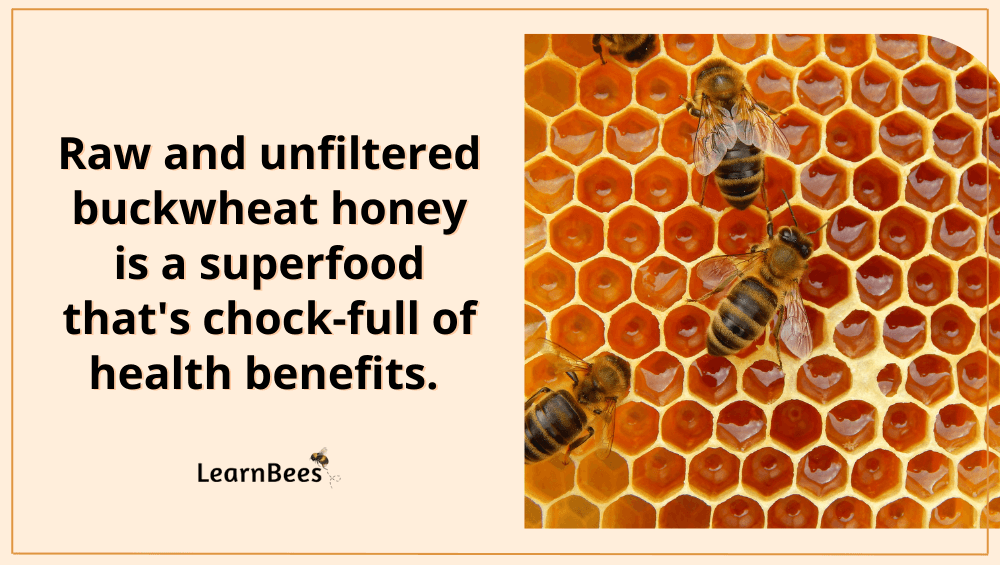
Buckwheat honey is rich in antioxidants. Antioxidants are compounds that may help your cells combat free radicals, which have been linked to heart disease, cancer, and other illnesses.
Buckwheat honey has antibacterial properties against Staphylococcus aureus and is effective in combating antibiotic-resistant bacteria.
But what else can buckwheat honey do? Let’s find out.
Benefit 1: Buckwheat Honey Can Soothe Your Sore Throat

Ready to hear something surprising?
In some clinical studies, buckwheat honey has shown to be more effective than cough syrup. For example, 300 children were given a single dose of honey before bed to soothe their sore throats and cough.(15)
What happened next?
After eating the honey, the parents reported that their children had less coughing and less cough severity. The children’s sleep quality also improved too.(16)
Because let’s face it.
When your child can’t sleep, neither can you. They’ll keep you up all night, making for an unhappy household.
Here’s what the doctor reported from that clinical study:
“Parents of 300 children 1 to 5 years old with URI reported that cough frequency, cough severity, bothersome nature of cough, and child and parent sleep quality improved after treatment in the groups that received honey.”(17)
Another study of more than 100 children also found similar results.(18)
But don’t forget:
You can use buckwheat honey for coughs and buckwheat for sore throats. But, babies under 12 months old shouldn’t eat honey. Honey can contain spores that can lead to infant botulism.(19, 20)
Benefit 2: Buckwheat Honey Can Reduce Cholesterol and Triglyceride Levels

Research has shown that honey can lower cholesterol levels in the blood. In turn, lower cholesterol may help reduce the risk of heart attack or stroke.
More specifically:
Honey has been shown to decrease LDL (bad) cholesterol levels by 6% and boost HDL (good) cholesterol levels. Honey has been shown to reduce triglyceride levels by 19%, which is associated with a reduced risk of heart disease.(21, 22)
Benefit 3: Buckwheat Honey Can Increase Antioxidants in Your Blood
In one study, researchers gave 25 healthy men buckwheat honey mixed with water or black tea. The researchers found that drinking buckwheat honey significantly increased the antioxidants in the participant’s bodies.(23)
But why are antioxidants important?
Because they can protect your cells against disease-causing free radicals. Research also suggests that antioxidants might protect against heart disease, diabetes, and cancer.(24, 25, 26)
Even better?
Honey is packed full of antioxidants like phenolic acids and flavonoids. And buckwheat honey, in particular, has been shown to increase these antioxidants in your blood.(27, 28)
Benefit 4: Buckwheat Honey Can Help Heal Wounds

Using honey to heal wounds may seem like a strange idea at first. But, honey has been found to destroy bacteria and remove moisture from wounds.
For example, one clinical article said this about the antimicrobial benefits of honey:
“The ingredients of honey have been reported to exert antioxidant, antimicrobial, anti-inflammatory, antiproliferative, anticancer, and antimetastatic effects. Many pieces of evidence suggest the use of honey in the control and treatment of wounds, diabetes mellitus, cancer, asthma, and also cardiovascular, neurological, and gastrointestinal diseases.”(29)
After reading that, using buckwheat honey on wounds doesn’t sound strange.
Benefit 5: Buckwheat Honey Can Give You Skincare Benefits
There’s no doubt about it. Honey has proven to be more versatile than many of us imagined. Not only has honey been shown to heal wounds and burns, but it’s also been included in skincare treatments.
Here are a few things honey can treat:
- Dandruff
- Psoriasis
- Pityriasis
- Tinea
- Seborrhea
- Diaper dermatitis
- Hemorrhoids
- Anal fissure
- Hair conditioning
That’s why honey is becoming popular in cosmetics. You’ll find it in lip products, moisturizers, after sun care, and shampoos and conditioners.(30)
Benefit 6: Buckwheat Honey Can Promote Heart Health

Buckwheat honey contains many heart-healthy minerals. A few nutrients include:
- Magnesium
- Fiber
- Rutin
- Copper
- Iron
Buckwheat plants also contain a rich source of rutin. Rutin has been shown to help blood circulation, prevent blood clots, reduce arthritis pain, and lower cholesterol. By preventing blood clots, rutin can lower your risk of heart disease. and decrease inflammation.(31, 32, 33, 34)
One study of 850 Chinese adults linked buckwheat intake to lower blood pressure, cholesterol, and improved blood lipids.(35)
Benefit 7: Buckwheat Honey Can Lower Your Blood Sugar
Buckwheat honey is considered safe to eat for most people with type 2 diabetes. It contains a good source of fiber and has a low to medium GI.(36)
In fact, it can be used as a potential sugar alternative. Honey is naturally sweeter than refined sugar, so less of it is needed to achieve the same level of sweetness.
Even better?
Some studies show that buckwheat can lower the blood sugar of diabetics. In fact, one study of rats with diabetes found that buckwheat decreased blood sugar levels by 12–19%.(37, 38, 39)
But keep in mind:
Honey can still elevate blood sugar levels, so eat honey in moderation if you have diabetes.
Foods to Pair Buckwheat Honey With

Spoiler alert:
Buckwheat honey is versatile and can be paired with many types of food. Many people even love the taste of crystallized honey. (But don’t worry, if you don’t enjoy it solid, you can quickly learn how to decrystallize honey).
Here are a few of my favorite foods to pair with buckwheat honey:
- Coffee
- Tea
- Cheese and crackers
- Yogurt
- Oatmeal
- Cereal
- Ice cream
- English muffins
- Bagels
- Toast
- Bread
- Pancakes
- Waffles
- Salad
- Fruit
- Chocolate
Pairing buckwheat honey with yogurt, ice cream, and fruit is a great way to add extra sweetness. You can also eat honey entirely on its own. Many people eat buckwheat simply for its health benefits. They’ll take one serving per day or use it to replace sugar.
FAQs about Buckwheat Honey
- How is buckwheat honey produced?
- Where do I buy buckwheat honey?
- What’s the difference between buckwheat honey vs. raw honey?
- Is buckwheat honey better than manuka honey?
- Are there buckwheat honey side effects I should be concerned about?
- What’s the buckwheat honey flavor like?
- Does buckwheat honey expire?
- What does buckwheat honey smell like?
How is buckwheat honey produced?
“Where does buckwheat honey come from?” is a common question.
To put it simply:
Buckwheat honey is made by bees who gather nectar from buckwheat flowers. Buckwheat is a fast-growing crop that’s typically found in the northern U.S., southwest Asia, Russia, and China.
—> Go back to the FAQs on buckwheat honey
More to Explore:
Where do I buy buckwheat honey?
Now you’re probably wondering where to buy buckwheat honey. Remember, when buying buckwheat honey, you want the bottle to say “raw” and “unfiltered.”
This means it hasn’t been pasteurized, so it still contains its nutrients. Store-bought honey is often filtered so it can lose its nutrients and minerals through the filtering process.(40, 41, 42)
The two best places to buy buckwheat honey are online or at your local farmers’ market. You can also buy organic buckwheat honey online. Just make sure it’s raw and unfiltered – just the way it should be.
—> Go back to the FAQs on buckwheat honey
More to Explore:
What’s the difference between buckwheat honey vs. raw honey?
This is a good question because it often confuses people.
So here’s the deal:
There are two main categories of honey: raw honey and processed honey.
Raw honey is best described as honey that hasn’t been tampered with. It’s as it exists in the beehive. So this means no added sweeteners and no filtering or pasteurizing.
The best part about it?
All the nutrients remain intact in raw honey. So you get honey that tastes good while also being good for you.
Processed honey is different. It gets filtered, and many of the nutrients are lost during the process. Also, the manufacturers often add artificial sweeteners to processed honey.(43, 44, 45)
So what’s the bottom line?
Buckwheat honey can be raw honey or processed honey. We recommend buying buckwheat honey that’s raw and unfiltered so you can get the maximum health benefits.
—> Go back to the FAQs on buckwheat honey
More to Explore:
Is buckwheat honey better than manuka honey?
It depends on what you mean by better.
Both manuka honey and buckwheat honey come with their fair share of health benefits. That’s why it’s hard to answer the “buckwheat honey vs. manuka honey” debate. That said, researchers who compared the two types found that buckwheat honey had greater antioxidant activity than manuka honey.(46)
Buckwheat honey also contains more protein, minerals, and phenols than manuka honey.(47, 48)
Phenol-rich foods have been shown to offer protection against chronic diseases and some cancers potentially.
On the other hand, manuka honey was found to have higher levels of methylglyoxal (MGO) than buckwheat honey. MGO is known for its antiviral, anti-inflammatory, and antibacterial benefits. That’s why manuka honey is commonly used for wound healing, sore throats, and improving digestion.(49)
But at the end of the day?
These two types of honey offer unique benefits, and you can incorporate both types into your diet for better health.
—> Go back to the FAQs on buckwheat honey
More to Explore:
- Wildflower Honey: Uses & Benefits
- How to Make Creamed Honey
- The Brutally Honest Truth About Sour Honey
Are there buckwheat honey side effects I should be concerned about?
If you’re allergic to buckwheat, you should avoid buckwheat honey because it can flare up your allergies.
But besides causing a buckwheat honey allergy in some people, buckwheat doesn’t have any known adverse effects when eaten in moderation.
That said, you shouldn’t give honey to babies under 12 months old. Honey can contain spores that could lead to infant botulism. Infant botulism is known to cause muscle weakness and troubled breathing in babies.(50, 51)
Besides that, honey is generally considered safe for people over one year old.
—> Go back to the FAQs on buckwheat honey
More to Explore:
What’s the buckwheat honey flavor like?
It’s somewhat sweet and somewhat nutty. Buckwheat honey’s flavor has been compared to many things. Some people think it tastes like coffee. Others think it tastes like molasses.
But one thing for sure?
It’s a unique flavor compared to other types of honey. That’s why you should give it a shot at least once.
—> Go back to the FAQs on buckwheat honey
More to Explore:
Does buckwheat honey expire?
“Does buckwheat honey go bad?” is a common question we get.
And the answer?
Well, it might surprise you. When stored properly, honey is the only food that never expires. In fact, archeologists have found pots of honey that were thousands of years old.(52)
And the best part?
The honey was still preserved. This means buckwheat honey doesn’t expire. And you can even pass a jar of honey down to your great-grandkids.
—> Go back to the FAQs on buckwheat honey
More to Explore:
What does buckwheat honey smell like?
I’ll be honest with you. Many people dislike the smell of buckwheat honey. It’s been described as a farm or barnyard hay-type smell. It can be a pungent smell, but the taste is fine.
